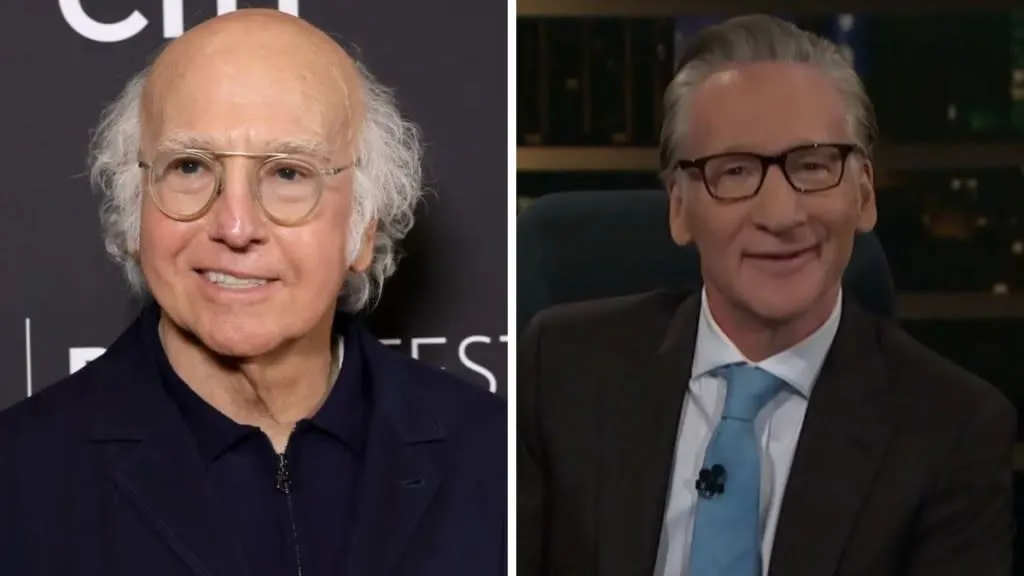Larry David: My Dinner With Adolf – A Satirical Critique
In a surprising and bold move, comedian Larry David recently published an essay that has set the internet ablaze, drawing a sharp line between his biting humor and the current political landscape. Titled ‘My Dinner With Adolf,’ this piece serves as a satirical barometer, measuring the absurdities of political discourse in light of recent events surrounding Bill Maher’s dinner with Donald Trump. With the finesse of a seasoned comedian, David unpacks the layers of absurdity, weaving together dark humor with pointed societal critique.
The Dinner Invitation
In his essay, David crafts an imaginary scenario where he finds himself at a dinner party with Adolf Hitler. The groundwork is laid with his opening reflections on the absurdity of sitting down with a man responsible for the death of millions. He juxtaposes this with Maher’s much-criticized invitation extended to former President Trump, challenging readers to confront the eerie similarities between trivializing history and normalizing figures of hate in contemporary discussions.
Historical Context and Satirical Comparison
David recalls the atrocities committed under Hitler’s regime, iterating how easy it is for society to overlook the frightening realities of leaders who stand against democratic values. By inserting his own voice into an imagined dinner conversation with Hitler, he raises even further the question of moral responsibility when it comes to political figures. His approach is both satirical and provocative, compelling audiences to consider the ramifications of their entertainment choices—particularly as it relates to leaders like Trump who have shown a penchant for divisive rhetoric.
Hitler as a Lens for Modern Politics
While some may respond to David’s piece with discomfort, the intent behind it is lucid. He captures the absurdity of engaging in dialogue with individuals who perpetuate hate and division, succinctly encapsulating the outrage felt by many at Maher’s invitation. Using Hitler as a foil, David cleverly invites readers to evaluate their own complicity in allowing such figures back into the mainstream narrative.
A Comedian’s Responsibility
David’s critique extends beyond just the immediate actions of Maher; it questions the very ethics of popular culture. As a comedian, David understands the unique power of humor to shine a light on uncomfortable truths. The question he raises—Is it ever responsible to engage with toxic ideologies for the sake of humor or dialogue?—is one that resonates deeply in today’s media landscape.
The Backlash and Reactions
Reactions to ‘My Dinner With Adolf’ have been polarized, with some applauding David for his courage while others deem it an overreach. In a time when the line between humor and harm often blurs, David’s piece challenges readers to reckon with their own perspectives towards figures like Trump, who have long been criticized for their controversial stances. This backlash is reflective of the deep societal divisions that comedians like David seek to address through their work.
The Role of Humor in Political Discourse
As we grapple with the ramifications of a politically charged environment, David’s work exemplifies how humor can serve as both a mirror and a weapon. It mirrors the absurdities of our reality while also wielding the power to provoke thought and discussion. David effectively connects the dots between historical atrocity and contemporary political discourse, prompting reflections that many choose to avoid.
The Impact of Satire
David’s essay has reignited conversations about the importance of satire as a tool for critique. A substantial portion of modern journalism and political commentary revolves around satire to elucidate the ludicrousness of the current state of affairs. By invoking such extreme representations, he essentially invites readers to confront their innate biases and question their allegiances.
The Dichotomy of Humor and Offense
Another layer to David’s argument is the dichotomy between humor and offense. While many comedians have found themselves walking a tightrope of political correctness, David’s unabashed approach reflects a belief that humor can disarm even the most charged topics. However, he reminds us that humor should come with responsibility, particularly when it risks trivializing horrific realities. David’s keen sense of satire thus acts not only as entertainment but also as a form of moral accountability.
The Impact on Cultural Conversations
In the larger scope of cultural conversations, David’s work—especially in light of his ‘Dinner With Adolf’ essay—brings to light how humor can provoke dialogue on sensitive subjects. The piece serves not merely as entertainment, but as a cultural touchpoint, forcing those who engage with it to reconsider their stance on figures like Maher and Trump. It alludes to the complex layers of upholding democratic values in the face of regressive rhetoric.
Conclusion: Provocation and Reflection
Ultimately, ‘My Dinner With Adolf’ stands as a testament to Larry David’s boldness in addressing contemporary issues through satire. The impact of his words reverberates beyond mere humor; they compel readers to confront uncomfortable truths about society’s interactions with harmful ideologies. In a world where dialogue with problematic figures has become normalized, David’s essay serves as a critical reminder of the grave responsibilities we carry as participants in civil discourse. As we laugh, reflect, and face the absurdities of modern politics, we must navigate the fine line between humor and accountability—a lesson delivered with humor by none other than Larry David.







